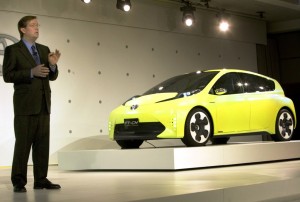Germany’s federal government and industrial gas and auto industries are investing more than €40 million to expand the country’s network of hydrogen fueling stations from 15 to 50. As part of the National Innovation Program for Hydrogen and Fuel Cell Technology, the stations will service the 5,000 fuel cell vehicles that are expected to be on the road in Germany by 2015. The Letter of Intent was signed by Federal Minister Peter Ramsauer and representatives of the Air Liquide, Air Products, Daimler, Linde and Total Germany.
The allure of fuel cells remains their efficiency of operation, roughly 50-60% compared to an internal combustion engine’s ~20%. Emissions are also attractive – no pollutants at the tailpipe and some studies indicate a drastically reduced overall well-to-wheel emissions when compared with today’s fossil fuel engines.
Automakers are currently lobbying in the U.S. for tax breaks and other taxpayer incentives for fuel cell cars to bring down their astronomical – as in $pace technology – costs. Hyundai thinks it can develop a fuel cell business if it can get the costs down to ~$50,000 a vehicle.
Since hydrogen fuel cell electric vehicles share a large proportion of the electric motor and drivetrain technology with other electric and plug-in hybrid vehicles, the challenges come from energy storage and refueling, as well as making the hydrogen fuel. Costs are astronomically high for this space age technology. A fuel cell is an electro-chemical machine like a battery, but unlike a battery, it does not need recharging. Refueling can also be a challenge since very high pressures are involved.
According to a Pike Research report published last year, the two light-duty FCV manufacturers who are best positioned in the formative stage of the market are Daimler and Honda.
However, Daimler has made ambitious announcements on fuel cell technology readiness in the past, and these did not pass the reality test. Daimler recently moved up its FCV demonstration target date to 2014 from 2015. We will see if anything comes from this except an expensive taxpayer subsidized demonstration program.
See also:
- UK Starts Hydrogen Fuel Cell Vehicle Project with Automakers, Utilities and Gas Suppliers – Cars on Road Promised by 2014
- Daimler and Honda Lead in Car Fuel Cell Development, Maybe
- World First – Suzuki Fuel Cell Motorcycle Street Legal in EU
- U.S. Navy Accepts GM Equinox Hydrogen Fuel Cell Vehicle
- Hawaii Hydrogen Initiative Moves Forward
- Boeing Phantom Eye Uses Ford Ranger Hydrogen Engines


